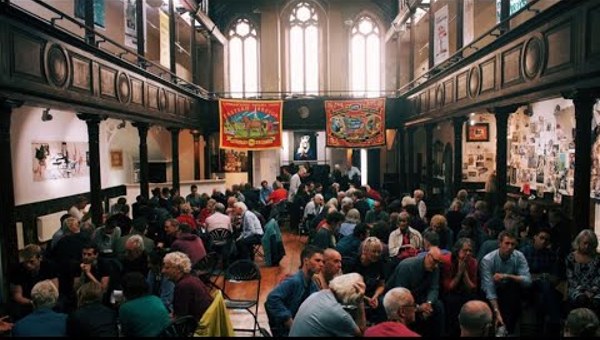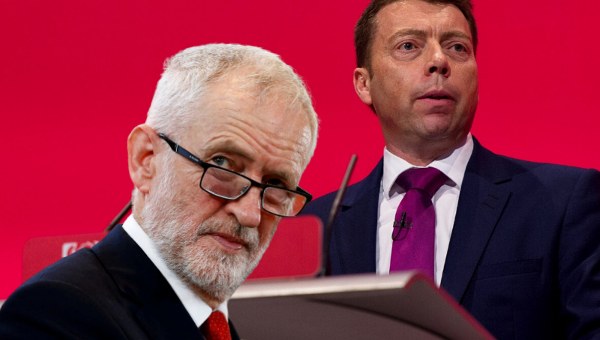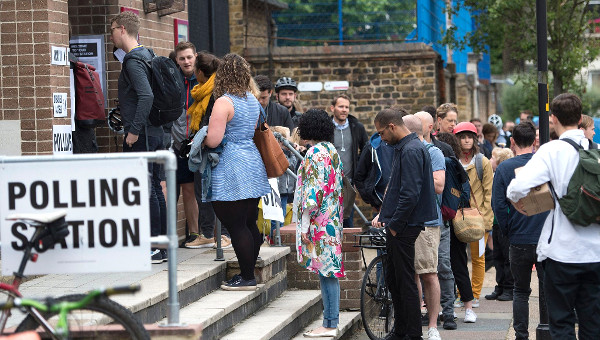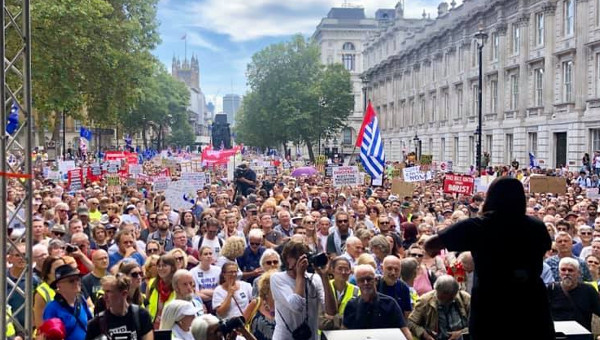The British Labour Party and Community Ownership Plans
Shadow Chancellor John McDonnell MP has unveiled Labour’s plans for a new, publicly-owned water system, run by local councils, workers and customers and for “unprecedented openness and transparency” in how the industry will be managed. Building on Labour’s manifesto commitment to bring key utilities back into public ownership, for the first time McDonnell has outlined in detail how they would do it.
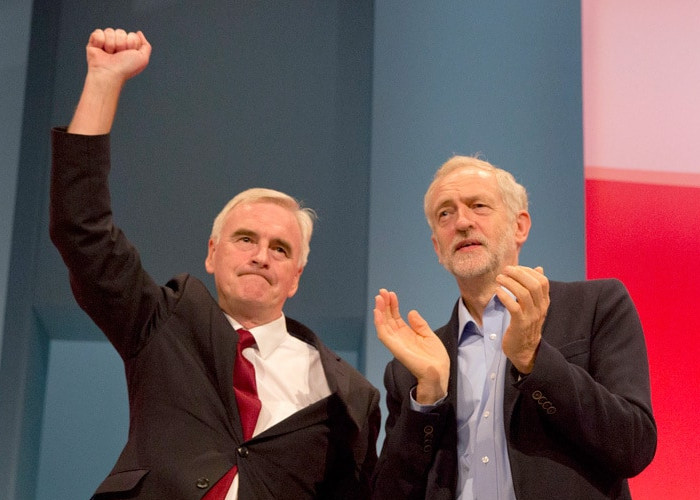 It comes as part of a package of measures to broaden ownership and control in the economy, including giving workers a third of seats on boards, billions of pounds for public services to be raised from Labour’s Inclusive Ownership Fund and a wide-ranging consultation on putting workers and service users in charge of running the water, energy, rail and mail industries which Labour will bring into public ownership. McDonnell also announced plans to launch a campaign against corporate tax avoidance and for Nobel laureate Professor Joseph Stiglitz to speak at the first meeting of a new ‘Bretton Woods’ international forum to reform global economic institutions.
It comes as part of a package of measures to broaden ownership and control in the economy, including giving workers a third of seats on boards, billions of pounds for public services to be raised from Labour’s Inclusive Ownership Fund and a wide-ranging consultation on putting workers and service users in charge of running the water, energy, rail and mail industries which Labour will bring into public ownership. McDonnell also announced plans to launch a campaign against corporate tax avoidance and for Nobel laureate Professor Joseph Stiglitz to speak at the first meeting of a new ‘Bretton Woods’ international forum to reform global economic institutions.
Coming off the back of plans to set up a dedicated public ownership unit in the Treasury set out earlier this week, McDonnell said Labour were “planned, ready and prepared” to hand economic power back to workers, citizens and communities to a degree never seen before. He added that the Labour Party is ready “not just to fight another election campaign but to implement our programme when we win” and that “at the heart of our programme is the greatest extension of economic democratic rights that this country has ever seen.”
Extending Economic Democratic Rights
John McDonnell MP, Labour’s Shadow Chancellor, said:
“Water bills have risen 40% in real terms since privatisation. Water companies receive more in tax credits than they pay in tax. Each day enough water to meet the needs of 20 million people is lost due to leakages.
“With figures like that, we can’t afford not to take them back. But let’s be clear, nationalisation will not be a return to the past.
“We don’t want to take power away from faceless directors only to centralise it all in a Whitehall office, to swap one remote manager for another.
“Today Rebecca Long Bailey and I are launching a large scale consultation on democracy in our public services. We are also setting out our plans for a new publicly-owned water system that puts this essential service back in the hands of local councils, workers and customers.
“There will be unprecedented openness and transparency in how the industry will be managed. We are ending the profiteering in dividends, vast executive salaries, and excessive interest payments. Surpluses will be reinvested in water infrastructure and staff, or used to reduce bills. Real investment will allow the highest environmental standards.”
On the Public and Community Ownership Unit
“It will bring in the external expertise we will need. Let me make it absolutely clear that the full weight of the Treasury will be used to take on any vested interests that try to thwart the will of the people.
“Some said our manifesto was a fantasy or a wish list, attractive but ultimately not deliverable. I’m telling you today that we are planned, ready and prepared. Not just to fight another election campaign but to implement our programme when we win.”
On the campaign against corporate tax avoidance
“We can’t trust the Tories on this but we shouldn’t just wait until we get into government. We should act now.
”One way is to mobilise shareholder power to demand companies uphold basic tax justice standards. Numerous institutions from churches to trade unions and pension funds have large scale shareholdings in many of the companies that avoid taxes. So today I’m announcing my intention to bring together these organisations to launch a shareholder campaign.
“We’ll be demanding companies sign up to the Fair Tax Mark standards, demonstrating transparently that they pay their fair share of taxes. So fair warning to the tax avoiders, we are coming for you.”
On global dialogue and the international economic forum
“Gordon Brown recently expressed his concern at the current weaknesses in global relationships to deal with any future economic crises. With major nations on the brink of a trade war, and with climate change accelerating, we can’t risk the kind of international breakdown that led to the Great Depression.
“Just as at the Bretton Woods conference in 1944, there is an urgent need to work out if the current international system can cope with these threats. It isn’t working for the Western world, where stagnant wages have helped feed the rise of the racist right.
“And it isn’t working for the developing world, whose wealth is plundered by multinational corporations or stashed in Western banks.
“We will be convening in the spring an international social forum to bring together leading economists, politicians and civil society representatives, launching a dialogue on the common risks we face and the actions we need to take.
“I am pleased to announce that Nobel Prize winning economist, Joseph Stiglitz, has agreed to lead this discussion for us.” •
Speech to Labour Conference 2018
John McDonnell MP
I want to start by thanking the Treasury Team: Peter Dowd, Shadow Chief Secretary, Jonathan Reynolds, Anneliese Dodds, Clive Lewis, Lyn Brown, Lord Dennis Tunnicliffe, Lord Bryan Davies and PPS Thelma Walker who won back Colne Valley from the Tories last year.
This month is the 10th anniversary of the financial crash. J.K.Galbraith in his book on the 1929 crash said sure you can try to create institutions to avoid crashes in the future but the best protection is memory. So it’s worth remembering. The causes of the crash were:
Yes, greed; yes, the deregulation that turned the City into a multibillion pound casino, but more importantly it was caused by the power of a small, financial elite who exercised too much power over our political system.
That power meant the bankers and speculators who caused the crisis wouldn’t be the ones who’d pay for it. It would be our families, working people, our businesses, our young people and especially the most vulnerable in our society.
It’s been 8 hard years of austerity and economic failure. In the 6th richest country in the world it cannot be right that 5000 of our fellow citizens are sleeping on our streets and that 4 million of our children are living in poverty, two thirds of them in households where someone is in work.
That tells you that wages are so low, still below 2010 levels. They are not sufficient to provide a decent life for many of our people. The Tories have created an age of insecurity where people have little if any power or control over their lives. It’s no wonder so many people voted for Brexit. They voted for any form of change. It was an anti-establishment vote.
So I believe it’s time. It’s time to shift the balance of power in our country. It’s time to give people back control over their lives.
Another Anniversary
You know, there’s another anniversary this year. One hundred years ago in 1918 the Labour Party adopted Clause Four as part of our party’s constitution. Let me remind you what it said: “to secure for the workers, by hand or by brain, the full fruits of their industry.”
I say the Clause 4 principles are as relevant today as they were back then. Fair, democratic, collective solutions to the challenges of the modern economy.
The Labour movement has always believed that democracy should not stop when we clock in at the factory gate, in the office lobby, or – like my Mum in BHS – behind the counter.
Democracy is at the heart of our socialism – and extending it should always be our goal. Our predecessors fought for democracy in Parliament, against the divine right of kings and the aristocracy. They fought for working people to get the franchise.
Our sisters fought for women’s suffrage in the teeth of ferocious opposition and our movement fought for workers to have a voice at work. The trade unions founded this party to take that democratic vision even further. So in 2018 I tell you that at the heart of our programme is the greatest extension of economic democratic rights that this country has ever seen.
It starts in the workplace.
It’s undeniable that the balance of power at work has been tipped against the worker. The result is long hours, low productivity, low pay and the insecurity of zero hour contracts.
I want to thank the IPPR for its recent report. It was a brilliant critique of the inequality embedded in today’s economy.
Archbishop Welby took some stick in the media and from some in the establishment for his support for the report. He wasn’t engaging in party politics. He was simply speaking the truth as a moral leader in our society. Just a few words of advice though Archbishop, when they get round to calling you a Marxist, I’ll give you some tips on how to handle it.
So let’s be certain. We will redress the balance of power at work. We will be proud to fulfil John Smith’s, our late leader’s promise, that workers will have trade union rights from day one whether in full time, part time or temporary work.
We’ll ban zero hours contracts. We will lift people out of poverty by setting a real living wage of £10 an hour. Wages will be determined by sectoral collective bargaining. And yes we will tackle the continuing scandal of the gender pay gap.
Corporate Governance
Real power comes from having the right to a collective say at work. Large corporations play a huge role in our lives, yet the decisions about running them are in the hands of a tiny few. Employees who create the wealth have no say in the key decisions that affect their future. After decades of talking about industrial democracy, Labour in government will legislate to implement it. As Jeremy announced yesterday, a third of the seats on company boards will be allocated to workers.
Power also comes from ownership. We believe that workers, who create the wealth of a company, should share in its ownership and, yes, in the returns that it makes.
Employee ownership increases a company’s productivity and encourages long term decision making. Let me thank the Co-op Party for its work on this and Gareth Thomas MP in particular for his ideas.
We will legislate for large companies to transfer shares into an “Inclusive Ownership Fund.” The shares will be held and managed collectively by the workers. The shareholding will give workers the same rights as other shareholders to have a say over the direction of their company. And dividend payments will be made directly to the workers from the fund. Payments could be up to £500 a year. That’s 11 million workers each with a greater say, and a greater stake, in the rewards of their labour.
Societal Dividend
But we all know it’s not just the employees of a company that create the profits it generates. It’s the collective investment in infrastructure, education and research and development that we as a society make that enables entrepreneurs to build and grow their businesses.
So we believe it’s right that society shares in the benefits that investment produces. That’s why a proportion of revenues generated by the ‘inclusive ownership funds’ will be transferred back to our public services as a social dividend. Over time, this will mobilise billions that could be spent supporting our public services and social security system.
Public Ownership
We are extending economic democracy even further by bringing water, energy, Royal Mail and rail into public ownership. Some press said the voters would be horrified. They couldn’t have been more wrong.
Public ownership has proved its popularity in opinion poll after opinion poll. It’s not surprising, look at the scandal of the privatisation of water. Water bills have risen 40% in real terms since privatisation. £18 billion has been paid out in dividends. Water companies receive more in tax credits than they pay in tax. Each day enough water to meet the needs of 20 million people is lost due to leakages. With figures like that, we can’t afford not to take them back.
But be clear, nationalisation will not be a return to the past. We don’t want to take power away from faceless directors to a Whitehall office, to swap one remote manager for another.
Today, Rebecca Long Bailey and I are launching a large scale consultation on democracy in our public services. We are also setting out our plans for a new publicly-owned water system that puts this essential service back in the hands of local councils, workers and customers.
There will be an unprecedented openness and transparency in how the industry will be managed. We are ending the profiteering in dividends, vast executive salaries and excessive interest payments.
Surpluses will be reinvested in water infrastructure and staff, or used to reduce bills. Real investment will allow the highest environmental standards.
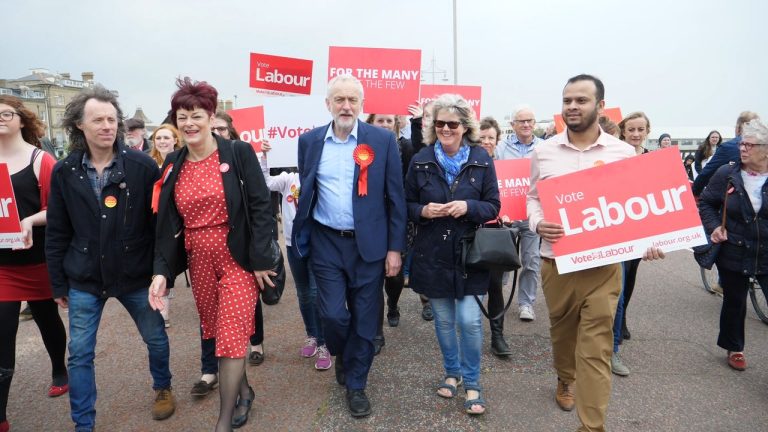
Public and Community Ownership Unit
People have had enough of being ripped off by privatisation. That’s why we’ve said no more PFIs and we’ll bring the PFIs back in house. Through our public ownership programme we will set up a ‘Public and Community Ownership Unit’ in the Treasury. It will bring in the external expertise we will need.
Let me make it absolutely clear that the full weight of the Treasury will be used to take on any vested interests that try to thwart the will of the people. Some said our manifesto was a fantasy or a wish list, attractive but ultimately not deliverable. I’m telling you today that we are planned, ready and prepared.
Not just to fight another election campaign but to implement our programme when we win.
Green Book
For too long that establishment has used the Treasury as a barrier against putting power back into the hands of the people. So we will reprogram the Treasury, rewriting its rule books on how it makes decisions about what, when, and where to invest.
We will end the Treasury bias against investing the regions and nations. And we’ll make sure it assesses spending decisions against the need to tackle climate change, protect our environment, drive up productivity and meet the investment challenges of the 4th industrial revolution.
Fair Taxation
We need to exert some people power over our tax system. There are millions of businesses out there which deserve our respect and we will always support them. They are responsible, ethical entrepreneurs, who pay their taxes and support our community. They should know that we are proud of them.
But there is a minority that don’t live up to those standards. They avoid paying their taxes on an industrial scale. They are denying our hospitals, our schools and carers the resources they need.
The Tories record on tackling tax avoidance and money laundering has been a disgrace. We can’t trust the Tories on this but we shouldn’t just wait until we get into government. We should act now.
One way is to mobilise shareholder power to demand companies uphold basic tax justice standards. Numerous institutions from churches to trade unions and pension funds have large scale shareholdings in many of the companies that avoid taxes.
So today, I’m announcing my intention to bring together these organisations to launch a shareholder campaign. We’ll be demanding companies sign up to the Fair Tax Mark standards, demonstrating transparently that they pay their fair share of taxes.
So fair warning to the tax avoiders, we are coming for you.
Global Dialogue
Gordon Brown recently expressed his concern at the current weaknesses in global relationships to deal with any future economic crises. With major nations on the brink of a trade war, and with climate change accelerating, we can’t risk the kind of international breakdown that led to the Great Depression. Just as at the Bretton Woods conference in 1944, there is an urgent need to work out if the current international system can cope with these threats.
Over the past few decades that system has concentrated power in the hands of an international financial elite. Individuals, communities, and even nation states have been made increasingly powerless. It isn’t working for the Western world, where stagnant wages have helped feed the rise of the racist right. And it isn’t working for the developing world, whose wealth is plundered by multinational corporations or stashed in Western banks.
We will be convening in the spring an international social forum to bring together leading economists, politicians and civil society representatives, launching a dialogue on the common risks we face and the actions we need to take.
I am pleased to announce that Nobel Prize winning economist, Joseph Stiglitz, has agreed to lead this discussion for us.
Brexit
This leads us inevitably to the urgent question of Brexit. I don’t have to repeat the criticisms we all have of the Tories’ behaviour over this echoed in the earlier conference debate. Their failures are in plain sight.
I just say to the Tories, in the interests of our country get out of the way and let us get on with securing a way forward. A way forward that will protect our economy, our jobs and standards of living for our people. If they won’t do that then, you know my preference, let’s have a general election.
We are keeping all the options for democratic engagement on the table. But look, I feel so strongly that these Tories should face the people. Face the people for the way they have recklessly put our country’s future at risk over the last two years.
On so many fronts you know the scale of the mess we will inherit from the Tories. A society whose social fabric has been run down to the point of dereliction. A struggling, mismanaged economy vulnerable to another crisis.
Past Shadow Chancellors have come to conference with warnings about how bad the situation is to reduce people’s expectations of what can be achieved when we go into government. This Shadow Chancellor is different.
Real Change
I want you to know that:
The greater the mess we inherit, the more radical we have to be; the greater the need for change, the greater the opportunity we have to create that change and we will.
The Tories’ austerity has been brutal. But what I have resented most is that they try to take away the dreams, the hope and optimism our people, especially our young people, that dream of building a better world.
But they fail to understand that we have an unwavering faith that together people can change the world. We will not settle for anything less.
Yesterday the press reported the Tories were drawing up secret plans for a quick general election. So the message from this conference is bring it on.
Whenever the general election comes, we are ready. Ready to campaign for victory, ready for Government, ready to build the future.
And you know, like Bill Shankly, we’ll be proud to call that future, socialism. Solidarity. •


